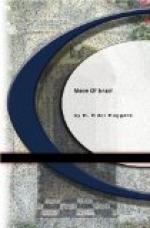“Remember, O Pharaoh, I pray thee, that Amon, god of the Egyptians, and Jahveh, the god of the Israelites, cannot rule together in the same land. If both abide in Egypt there will be a war of the gods wherein mortals may be ground to dust. Therefore, I pray thee, let Israel go.”
After I had risen and was recovered, I copied out this report in my fairest writing, refusing to tell any of its purport, although all asked, among them the Vizier Nehesi, who offered me a bribe to disclose its secret. This came to the ears of Seti, I know not how, and he was much pleased with me about the matter, saying he rejoiced to find that there was one scribe in Egypt who could not be bought. Userti also questioned me, and when I refused to answer, strange to say, was not angry, because, she declared, I only did my duty.
At last the roll was finished and sealed, and the Prince with his own hand, but without speaking, laid it on the knees of Pharaoh at a public Court, for this he would trust no one else to do. Amenmeses also brought up his report, as did Nehesi the Vizier, and the Captain of the guard which saved us from death. Eight days later the Prince was summoned to a great Council of State, as were all others of the royal House, together with the high officers. I too received a summons, as one who had been concerned in these matters.
The Prince, accompanied by the Princess, drove to the palace in Pharaoh’s golden chariot, drawn by two milk-white horses of the blood of those famous steeds that had saved the life of the great Rameses in the Syrian war. All down the streets, that were filled with thousands of the people, they were received with shouts of welcome.
“See,” said the old councillor Bakenkhonsu, who was my companion in a second chariot, “Egypt is proud and glad. It thought that its Prince was but a dreamer of dreams. But now it has heard the tale of the ambush in the pass and learned that he is a man of war, a warrior who can fight with the best. Therefore it loves him and rejoices.”
“Then, by the same rule, Bakenkhonsu, a butcher should be more great than the wisest of scribes.”
“So he is, Ana, especially if the butcher be one of men. The writer creates, but the slayer kills, and in a world ruled of death he who kills has more honour than he who creates. Hearken, now they are shouting out your name. Is that because you are the author of certain writings? I tell you, No. It is because you killed three men yonder in the pass. If you would become famous and beloved, Ana, cease from the writing of books and take to the cutting of throats.”
“Yet the writer still lives when he is dead.”
“Oho!” laughed Bakenkhonsu, “you are even more foolish than I thought. How is a man advantaged by what happens when he is dead? Why, to-day that blind beggar whining on the temple steps means more to Egypt than all the mummies of all the Pharaohs, unless they can be robbed. Take what life can give you, Ana, and do not trouble about the offerings which are laid in the tombs for time to crumble.”




